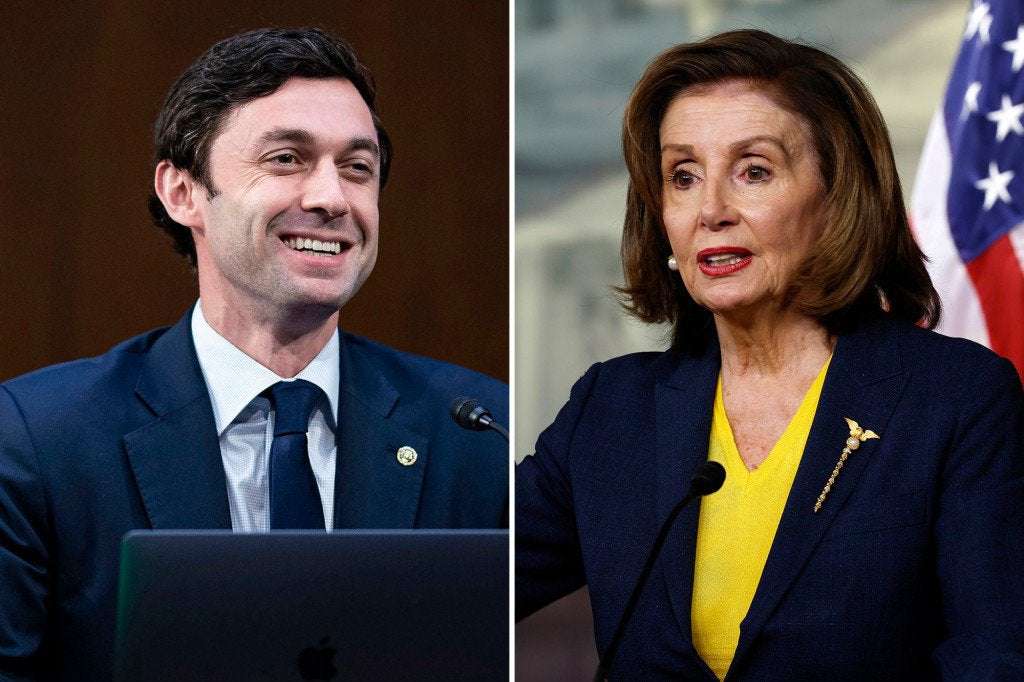Georgia Sen. Jon Ossoff is looking to introduce a bill that would ban members of Congress from trading individual stocks — a practice that House Speaker Nancy Pelosi has defended as her husband rakes in millions of dollars trading shares of tech companies, The Post has learned.
The Ossoff ethics bill, which the Democratic freshman Senator plans to introduce once he finds a Republican co-sponsor, would crack down on conflicts of interest by making it illegal for lawmakers and their families to trade stocks while in office, a Washington, D.C. source close to the situation said.
It would also likely require lawmakers put their assets in blind trusts — a step that the 34-year-old Ossoff completed himself months after being elected in January 2021.
No Senate Republicans appear to have publicly come out against congressional stock trades, so Ossoff may have trouble finding a co-sponsor in the Senate. But Republican support in the House is more likely, since several GOP House members including Texas Reps. Michael Cloud and Chip Roy have come out against the practice.
Georgia Sen. Jon Ossoff can introduce the Ossoff ethics bill with help from a Republican co-sponsor. AP
Another proposal to curb Congress trades, the Ban Conflicted Trading Act, was introduced in the Senate in March by four Democratic Senators including Sen. Jeff Merkeley of Oregon and Ossoff’s fellow Georgia freshman Raphael Warnock. It also has an accompanying bipartisan House version backed by Rep. Alexandria Ocasio-Cortez (D-NY) and Roy, among other Democrats and Republicans.
But the Ban Conflicted Trading Act would only ban trades by members of Congress and their senior staff — not spouses or families — so Paul Pelosi’s stock-picking would remain legal.
Ossoff’s forthcoming bill would be stricter by closing the spouse loophole, the source said. That would put the new bill more in line with a bipartisan House proposal called the TRUST In Congress Act, which would ban close family members from trading and is supported by Democrats including Rep. Abigail Spanberger (D-VA), Rep. Mondaire Jones (D-NY) and Karen Bass (D-Calif.), as well as Republicans like Roy, Cloud, Scott Perry (R-Pa.) and Fred Keller (R-Pa.).
House Speaker Nancy Pelosi has defended stock trading by members of Congress, while her husband Paul has raked in millions of dollars through shares of big tech companies. AFP via Getty Images
“As Speaker Pelosi’s recent transactions make clear, decisions made for the people should be separate than decisions made for personal enrichment,” Roy told The Post.
Insiders say that Republicans in the Senate could fold and support an Ossoff-style bill if they feel political pressure. One person applying such pressure is Arizona Republican Senate primary candidate Blake Masters, who says both Pelosi and Senate Republicans are “wrong” about the issue.
“These lawmakers are just out of touch with how normal people view the situation,” Masters told The Post. “Members of Congress should not be buying call options on Big Tech companies they’re in charge of regulating, that is ludicrous.”
Rep. Chip Roy (R-TX) has united with Democrats to support a ban of stock trades by members of Congress. Tom Williams/CQ-Roll Call/Sipa U
Asked for comment on Ossoff’s potential Congressional ethics bill, spokesman Jake Best said, “Don’t have anything I can share just yet.”
News of Ossoff’s potential bill comes as Pelosi and other politicians from both parties catch flak for making millions trading stocks despite potentially being privy to insider information that can move markets. Current rules allow members of Congress and their families to trade stocks as long as they disclose the moves within 45 days, though dozens of lawmakers have failed to file reports on time.
Ossoff has criticized the practice, but has yet to sign onto any specific bill.
Ossoff and Warnock in particular appear to owe their political careers to poorly-received Congressional stock trades. Their opponents in the 2021 Georgia special election — Republicans Kelly Loeffler and David Perdue — both faced investigations for trading stocks ahead of the 2020 stock market crash after receiving Senate briefings about the coronavirus.
While Loeffler and Perdue were never charged with insider trading, Ossoff and Warnock both used the trades as ammunition to hammer the incumbents and ultimately won by slim margins.
The Georgia election shows why both Republicans and Democrats should support a crackdown on stock trading, according to Craig Holman, an ethics lobbyist at progressive think tank Public Citizen.
“David Perdue and Kelly Loeffler lost their seats, I think, because of the allegations of insider trading,” Holman told The Post. “Had those allegations not happened, I suspect the Republicans would’ve held onto the senate.”
“Members of both parties should realize it’s a politically risky thing to do, to trade on the stock market,” Holman added.
Concerns about insider trading have also stretched beyond Congress.
In October, Ossoff called for a ban on stock trading by Federal Reserve officials following revelations that two regional reserve bank presidents had actively traded shares in 2020. Fed Chairman Jerome Powell banned the practice weeks later.

MoonShadowArt on January 8th, 2022 at 21:55 UTC »
I believe a recent poll showed that 70%+ of Americans, like the idea of a stock trade ban for politicians.
crabby-dragon on January 8th, 2022 at 19:41 UTC »
As well he should.
Between him and Warnock, Georgia is half way respectable at the federal level!
BumblesAZ on January 8th, 2022 at 19:38 UTC »
The Ossoff ethics bill will crack down on conflicts of interest by making it illegal for lawmakers and their families to trade stocks while in office.
Ossoff’s bill would be stricter by closing the spouse loophole, the source said, putting the new bill more in line with a bipartisan House proposal called the TRUST In Congress Act, which would ban close family members from trading.